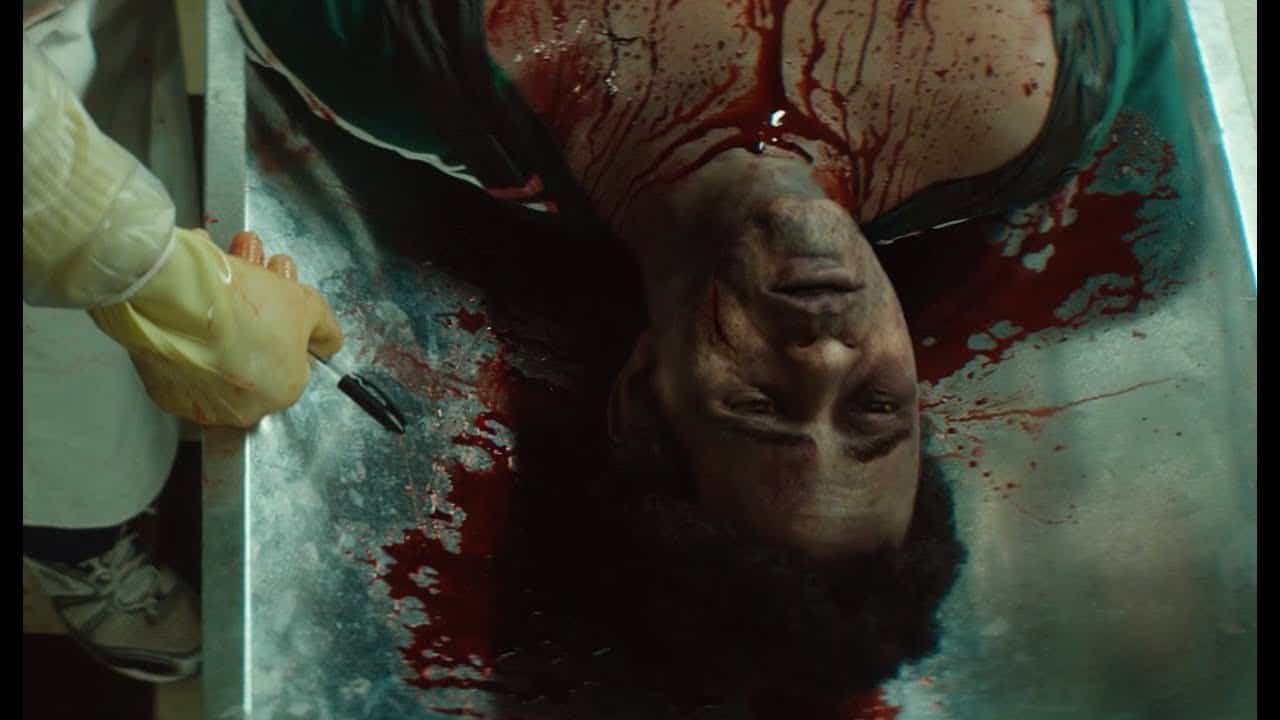
Talking to the dead is one thing, but pissing them off is a whole other level of bad news.
Movies about characters who can converse with the dead are ubiquitous enough to be a sub-genre of their own, and to their own detriment they typically follow a fairly uniform path. Our hero is tasked with solving some mystery or delivering a message and uses their ability to accomplish it, blah blah blah. There are the good (The Sixth Sense), the bad (Hereafter), and the under-appreciated (Ghost Town), but very few of them deviate too far from the common formula.
That changes in brutal, bloody, and EC Comics-style with The Nightshifter.
Stênio (Daniel de Oliveira) is an assistant coroner kept busy by the crime-filled streets of a big Brazilian city. A new corpse arrives on his slab, blood spilling from violently made holes in his body, and the two men share a few words. The dead man pleads for Stênio to contact his family so he doesn’t end up in a pauper’s grave, and while Stênio typically resists the urge to use his conversations to affect real world change he relents. It won’t be the only exception he makes, but he’ll wish it was.
Another corpse reveals a secret about Stênio’s wife, and in a planned act of jealousy fueled rage he sets in motion a plot for revenge. It spirals wildly out of control leaving him both regretting his decision and fearing for his life. Worse, his two children find themselves targeted too, and soon Stênio is fighting against otherworldly forces for his family and his soul.
Writer/director Dennison Ramalho has been making short films for twenty years, and while he’s co-written someone else’s feature (Coffin Joe’s 2008 return, Embodiment of Evil) he’s only now making his own feature debut. The Nightshifter is quite the calling card too as the film oozes atmosphere even as it captures the harsh reality of Brazil’s urban nightmare. The morgue is as hopping as any nightclub, and the casualness with which violence is inflicted doesn’t go unnoticed. The subtext offers a powerful commentary while the film’s main narrative serves to deliver a tale about the high cost of revenge.
An act of retribution triggers another, and the cycle of brutality that haunts the streets comes home for Stênio in ways that continue to hurt those he loves. The realization of what he’s done comes too late, and the film shifts away from the initial setup — a guy who talks to the dead — into a much darker thriller about the trouble that causes.
Ramalho captures his world with an eye for both the natural and the unnatural as the latter invades with a fury. There’s a sad beauty to much of it, from the opening credits with police radio chatter to the look on Stênio’s face as he moves from rage to regret, and it carries over to the dead themselves. Rather than simply have actors playing dead and speaking, Ramalho applies some combination of digital and practical trickery that gives the corpses a uniquely haunting look as they talk. It’s disorienting at first which plays smartly against the otherwise calm, everyday nature of Stênio’s conversations.
If the film stumbles it’s in moments where it veers too closely to the likes of Sam Raimi’s Drag Me to Hell, and while that probably seems like a plus to some of you it’s with the film’s least desirable elements. Loud music/sound stingers squelch any attempt at legitimate scares as they distract and negate the intended effect with cheap reactionary jumps. The film also takes a bit too much glee in the physical abuse of an innocent and seems to disregard its own rules at times with the nature of the undead.
The Nightshifter marks Ramalho as a filmmaker who deserves a presence on the world stage as he delivers a feature filled with striking imagery, terror, and themes of violence both real and imagined. You’ll never look at the ability to talk to the dead as a “gift” again.
[Note: Our review originally ran during Fantasia 2018.]
Related Topics: Fantasia Film Festival, Fantastic Fest, Film Festivals
